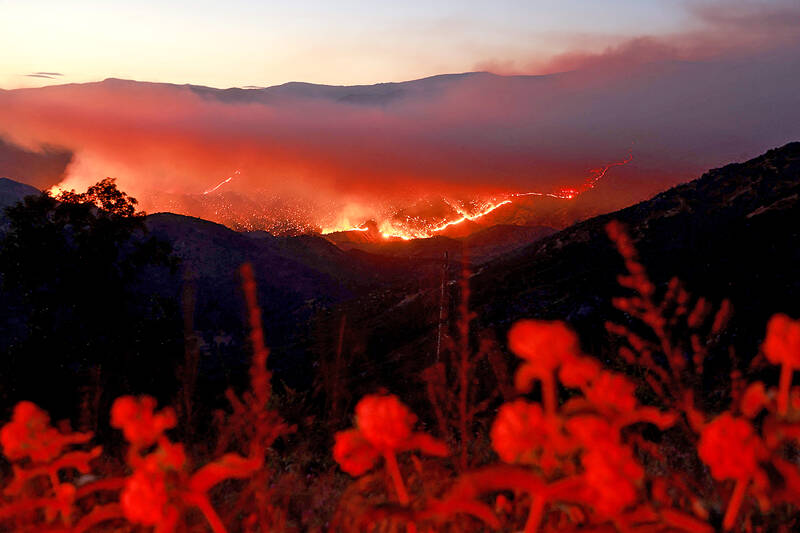From carbon pollution to sea-level rise to global heating, the pace and level of key climate change indicators are all in uncharted territory, more than 60 top scientists said yesterday.
Greenhouse gas emissions from burning fossil fuels and deforestation hit a new high last year, averaging over the past decade a record 53.6 billion tonnes per year — that is 100,000 tonnes per minute — of carbon dioxide or its equivalent in other gases, they reported in a peer-reviewed update.
Earth’s surface temperature last year breached 1.5°C for the first time, and the additional carbon humanity can emit with a two-thirds chance of staying under that threshold long-term — our 1.5°C “carbon budget” — would be exhausted in a couple of years, they said.

Photo: AFP
Investment in clean energy outpaced investment in oil, gas and coal last year two-to-one, but fossil fuels accounted for more than 80 percent of global energy consumption, and growth in renewables still lags behind new demand.
Included in the 2015 Paris Agreement on climate as an aspirational goal, the 1.5°C limit has since been validated by science as necessary for avoiding a catastrophically climate-addled world.
The hard cap on warming to which nearly 200 nations agreed was “well below” 2°C, commonly interpreted to mean 1.7°C to 1.8°C.
“We are already in crunch time for these higher levels of warming,” coauthor Joeri Rogelj, a professor of climate science and policy at Imperial College London, told journalists at a news conference.
“The next three or four decades is pretty much the timeline over which we expect a peak in warming to happen,” he said.
No less alarming than record heat and carbon emissions is the gathering pace at which these and other climate indicators are shifting, according to the study, published in Earth System Science Data.
Human-induced warming increased over the past decade at a rate “unprecedented in the instrumental record,” and well above the 2010-2019 average registered in the UN’s most recent Intergovernmental Panel on Climate Change report in 2021.
“I tend to be an optimistic person,” said lead author Piers Forster, head of the University of Leed’s Priestley Centre for Climate Futures. “But if you look at this year’s update, things are all moving in the wrong direction.”
The rate at which sea levels have shot up in the past few years is also alarming, the scientists said.
After creeping up, on average, well under 2mm per year from 1901 to 2018, global oceans have risen 4.3mm annually since 2019.

MONEY GRAB: People were rushing to collect bills scattered on the ground after the plane transporting money crashed, which an official said hindered rescue efforts A cargo plane carrying money on Friday crashed near Bolivia’s capital, damaging about a dozen vehicles on highway, scattering bills on the ground and leaving at least 15 people dead and others injured, an official said. Bolivian Minister of Defense Marcelo Salinas said the Hercules C-130 plane was transporting newly printed Bolivian currency when it “landed and veered off the runway” at an airport in El Alto, a city adjacent to La Paz, before ending up in a nearby field. Firefighters managed to put out the flames that engulfed the aircraft. Fire chief Pavel Tovar said at least 15 people died, but

LIKE FATHER, LIKE DAUGHTER: By showing Ju-ae’s ability to handle a weapon, the photos ‘suggest she is indeed receiving training as a successor,’ an academic said North Korea on Saturday released a rare image of leader Kim Jong-un’s teenage daughter firing a rifle at a shooting range, adding to speculation that she is being groomed as his successor. Kim’s daughter, Ju-ae, has long been seen as the next in line to rule the secretive, nuclear-armed state, and took part in a string of recent high-profile outings, including last week’s military parade marking the closing stages of North Korea’s key party congress. Pyongyang’s official Korean Central News Agency (KCNA) released a photo of Ju-ae shooting a rifle at an outdoor shooting range, peering through a rifle scope

South Korea would soon no longer be one of the few countries where Google Maps does not work properly, after its security-conscious government reversed a two-decade stance to approve the export of high-precision map data to overseas servers. The approval was made “on the condition that strict security requirements are met,” the South Korean Ministry of Land, Infrastructure and Transport said. Those conditions include blurring military and other sensitive security-related facilities, as well as restricting longitude and latitude coordinates for South Korean territory on products such as Google Maps and Google Earth, it said. The decision is expected to hurt Naver and Kakao

Gaza is rapidly running out of its limited fuel supply and stocks of food staples might become tight, officials said, after Israel blocked the entry of fuel and goods into the war-shattered territory, citing fighting with Iran. The Israeli military closed all Gaza border crossings on Saturday after announcing airstrikes on Iran carried out jointly with the US. Israeli authorities late on Monday night said that they would reopen the Kerem Shalom crossing from Israel to Gaza yesterday, for “gradual entry of humanitarian aid” into the strip, without saying how much. Israeli authorities previously said the crossings could not be operated safely during